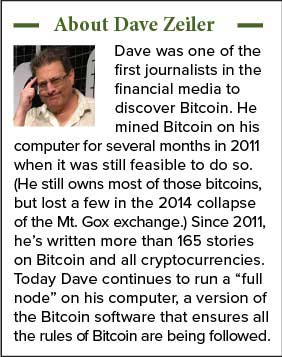Would you invest in a digital currency called "WhopperCoin"?
The announcement last week by Burger King Russia (NYSE: QSR) of this dubious new digital asset inspired us here at Money Morning to make a comprehensive list of cryptocurrencies with curious names and ill-conceived objectives.

WhopperCoin is basically a rewards program that uses a newly created cryptocurrency instead of a more straightforward rewards card. Customers earn WhopperCoins whenever they make a purchase. When you accumulate 1,700 WhopperCoins, you can use them to buy a "free" Whopper.
That wouldn't be so bad, but the company intends for WhopperCoin tokens to be tradeable assets, just like established cryptocurrencies Bitcoin and Ethereum.
"Now Whopper is not only burger that people in 90 different countries love - it's an investment tool as well," Ivan Shestov, head of external communications at Burger King Russia, said in a press release. "According to the forecasts, cryptocurrency will increase exponentially in value. Eating Whoppers now is a strategy for financial prosperity tomorrow."
And if you believe that, I've got a bridge I'd like to sell you in Vladivostok.
While it's true that a few of the better cryptocurrencies will rise dramatically in value, it's extremely unlikely that WhopperCoin will be among them.
But the rapid rise in the value of the leading cryptocurrencies - Bitcoin is up 700% and Ethereum is up 4,600% in 2017 alone - has created a "gold rush" mentality.
That has driven the obsession with initial coin offerings (ICOs). People mistakenly believe that investing in virtually any cheap cryptocurrency today will make them a millionaire tomorrow.
Most of the "oddball" cryptocurrencies we'll look at today are certain to fail.
You won't believe some of these are even real...
A List of Cryptocurrencies Investors Should Avoid
- InsaneCoin: You'd think the name would scare off investors, but InsaneCoin has a market cap of nearly $2 million, good for 357th place on CoinMarketCap's list of more than 1,100 cryptocurrencies. The current price is about $0.12. While the website touts several improvements it has made to the open-source Bitcoin code, it's vague on what people are supposed to do with it. From the InsaneCoin website: "InsaneCoin is more than just a coin, it is a happening... a state of mind. You don't have to be insane to be part of our community but it sure couldn't hurt."
- Dogecoin: This cryptocurrency, created as a joke in 2013, was based on the popular Internet meme (the "doge" was a Shiba Inu dog). It was created for no other purpose, yet refuses to die. Astonishingly, Dogecoin sits in 38th place on the CoinMarketCap list with a total value of $219 million.
- Dentacoin: This cryptocurrency debuted over the summer. While Dentacoin's creators have lofty goals of "improving dental care" and "making it affordable," it's essentially a glorified rewards card. Like many ultra-specific cryptocurrencies, Dentacoin is a solution in search of a problem. Each token is worth a mere $0.00183, but the market cap of $2.96 million puts it in 315th place on CoinMarketCap.
BREAKING: New Legislation Could Turn Tiny Pot Stocks into Millions. Click Here...
- TrumpCoin: Launched in February 2016, TrumpCoin was created originally as a trendy way to raise money for Donald Trump's presidential campaign. Now the goal is "to support President Trump and his vision to Make America Great Again" by supporting various causes and projects. (President Trump has no connection to the coin.) It's unclear why a cryptocurrency is required for this.
- PutinCoin: Why a PutinCoin? The website says, "PutinCoin was created to pay tribute to the people and the president of one of the largest and greatest country[sic] in the world: Russia!" The site has less to say about the functional purpose of PutinCoin, other than to "support the very fast growing Russian economy." PutinCoin may want to watch its back, however, as Russian Deputy Prime Minister Arkady Dvorkovich suggested two weeks ago that officials are discussing the creation of a state-backed cryptocurrency.

- EarthCoin: You'd think this coin would have something to do with saving the planet. But the EarthCoin website seems more concerned with libertarian principles. In particular, it rails against the evils of fiat currencies - it even quotes legendary U.S. Federal Reserve foe Ron Paul. It's intended to be "a coin that represents us all" - whatever that means. With a market cap of $11.5 million, EarthCoin ranks 197th on the CoinMarketCap list.
- MoonCoin: MoonCoin has specific features but lacks focus. It can do micropayments, has its own programming language, and - get this - can monetize things you like on social media. With "Smart Likes," just liking a company, place, or celebrity is all you need do to start earning MoonCoin. The current drawback, other than thin participation, is that MoonCoins have little value ($0.000062). Also not helping is the enormous supply of more than 222 billion coins (more than 10,000 times that of Bitcoin) and paltry demand.
But as odd as these cryptocurrencies are, the sheer cheekiness of this next one will absolutely stun you...
[mmpazkzone name="in-story" network="9794" site="307044" id="137008" type="4"]
- Useless Ethereum Token: This cryptocurrency is a transparent scam, launched in July. Its anonymous creator is very clear on the website: "You're going to give some random person on the Internet money, and they're going to take it and go buy stuff with it." The site is obviously satire, and yet... people still bought UET. Incredibly, the price shot up as high as $58 before collapsing. Today, UET coins trade for $0.0167. Its creator, one imagines, is rich.
- Woodcoin: This cryptocurrency exists because its backers didn't like the rates at which other coins are created. So they created Woodcoin, a digital currency with a block reward based on harmonics and "the longest reward schedule of any other cryptocurrency." The first half of the Woodcoin supply is spread over 200 years, and the second half... well, the site doesn't say, but none of us will be here to worry about it.
- Marijuana Coins: How many marijuana cryptocurrencies is enough? Right now there are at least four: PotCoin, HempCoin, CannibisCoin, and DopeCoin. All are geared to make buying marijuana easier (and anonymous) in those states where it is legal. But only HempCoin really differentiates itself, having a component that also connects the marijuana growers. In this case, a cryptocurrency makes sense - but not four.
- Synthorn: Finally we have Synthorn, which is an Ethereum-based cryptocurrency that "tokenizes" synthetic rhino horn aphrodisiac pills. The creators are trying to gauge possible consumer demand for such a product. That's right, you can't even use your Synthorn to buy anything. As the website puts it, "Please consider this a donation, as the product may not proceed to production."
A Pot "Bombshell" Just Hit Canada: For our neighbors to the north, it's shocking news. But it could be the best news of all time for marijuana stock investors. In fact, this single "bombshell" event could unleash a new pot stock boom that will blow the doors off anything we've seen up to this point. And by putting a couple of hundred bucks into a handful of tiny Canadian weed companies, you could pocket life-changing gains - turning a few hundred bucks into a fortune overnight. Watch this now to get all the details...
Follow me on Twitter @DavidGZeiler and Money Morning on Twitter @moneymorning, Facebook, or LinkedIn.
About the Author
David Zeiler, Associate Editor for Money Morning at Money Map Press, has been a journalist for more than 35 years, including 18 spent at The Baltimore Sun. He has worked as a writer, editor, and page designer at different times in his career. He's interviewed a number of well-known personalities - ranging from punk rock icon Joey Ramone to Apple Inc. co-founder Steve Wozniak.
Over the course of his journalistic career, Dave has covered many diverse subjects. Since arriving at Money Morning in 2011, he has focused primarily on technology. He's an expert on both Apple and cryptocurrencies. He started writing about Apple for The Sun in the mid-1990s, and had an Apple blog on The Sun's web site from 2007-2009. Dave's been writing about Bitcoin since 2011 - long before most people had even heard of it. He even mined it for a short time.
Dave has a BA in English and Mass Communications from Loyola University Maryland.



